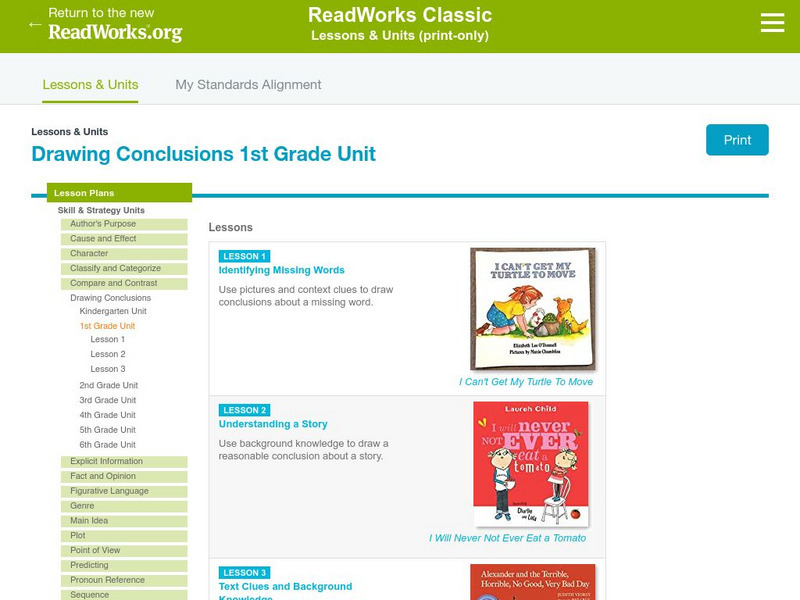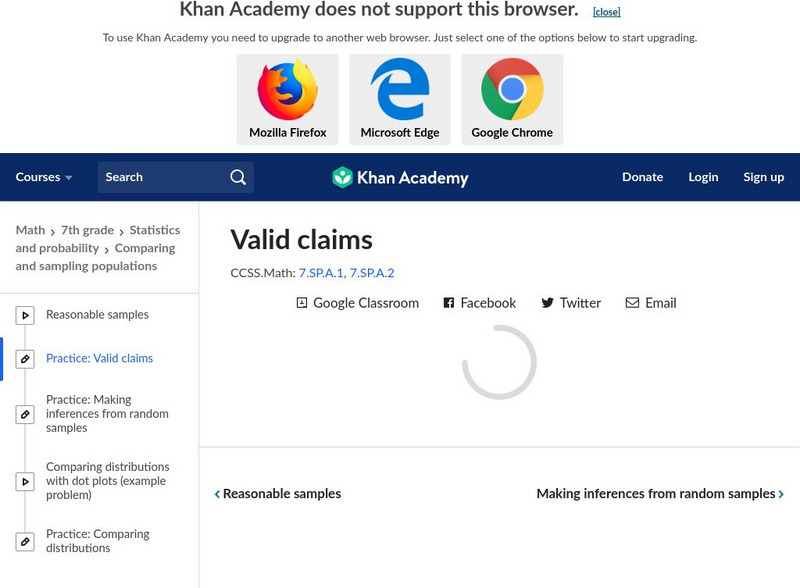Polk Brothers Foundation Center for Urban Education at DePaul University
De Paul University: Center for Urban Education: I Can Classify and Infer When I Read [Pdf]
This site contains links to two graphic organizers to guide and assess the understanding of nonfiction text in science and social studies.
Polk Brothers Foundation Center for Urban Education at DePaul University
De Paul University: Center for Urban Education: I Can Draw Conclusions: History Analysis [Pdf]
Students can use these guiding questions as they complete two graphic organizers about a historical event. Students will then ask guiding questions about the historical event to draw conclusions about the historical event.
Polk Brothers Foundation Center for Urban Education at DePaul University
Depaul University: Center for Urban Education: Make/explain an Inference [Pdf]
In this learning module, students will find links to five graphic organizers. Students will be able to use the resources to help them make inferences...
Polk Brothers Foundation Center for Urban Education at DePaul University
De Paul University: Center for Urban Education: Can Infer Meaning of a Multiple Meaning [Pdf]
Learners will analyze a word in several different sentences. Students will determine the meaning of the same word in several different contexts. Learners will also write their own sentences with the same word in several different contexts.
Read Works
Read Works: Drawing Conclusions 3rd Grade Unit
[Free Registration/Login Required] A two-lesson unit on drawing conclusions through which students learn how to recognize the difference between implicit information and drawing conclusions. Students also learn to draw conclusions in...
Read Works
Read Works: Drawing Conclusions 1st Grade Unit
[Free Registration/Login Required] A three-instructional activity unit on drawing conclusions through which students learn how to use pictures and context clues to discover a missing word and to draw conclusions about a story. Students...
Read Works
Read Works: Drawing Conclusions Kindergarten Unit: Short Story
[Free Registration/Login Required] A lesson plan teaching students to make conclusions based on a sentences and short texts. Students use textual cues to explain how the conclusions were reached. Ideas for direct teaching, guided...
E Reading Worksheets
E Reading Worksheets: Making Predictions Worksheets and Lessons
In this learning module, students will learn more about making predictions in reading. Worksheets and a leson are provided to support Tier I, Tier II, and Tier III students.
Polk Brothers Foundation Center for Urban Education at DePaul University
Depaul University: Center for Urban Education: Inference Organizer [Pdf]
Students will use a graphic organizer to help them make inferences. Students will list the literal text evidence and make an educated guess based on the text evidence.
Polk Brothers Foundation Center for Urban Education at DePaul University
Depaul University: Center for Urban Education: I Can Explain an Inference [Pdf]
This tool can be used to help students articulate their answers about fiction pieces. Students will quote the text, provide an inference, and give a justification.
Polk Brothers Foundation Center for Urban Education at DePaul University
De Paul University: Center for Urban Education: I Can Infer About a Story or an Event [Pdf]
Students will use this graphic organizer to help them make an inference about a story or an event. Students will list the literal text evidence and then make an inference about the text evidence.
Polk Brothers Foundation Center for Urban Education at DePaul University
De Paul University: Center for Urban Education: Can Infer Meaning of a Word in Context [Pdf]
This activity contains two graphic organizers that will help students infer the meaning of words in context. Students can use these graphic organizers as they read nonfiction texts, particularly while reading in the content area.
E Reading Worksheets
E Reading Worksheets: Inferences Worksheets
In this learning module, students will learn more about making inferences. Worksheets are provided to reinforce the skill of making inferences. This module is designed to support Tier I, Tier II, and Tier III students.
Quizlet
Quizlet: Main Idea, Main Idea Match
Terms related to main idea are included in this review "Match" game. Questions are provided for the following words: central idea, main idea, conclusion, infer, inferences, interesting detail, subject, summarizing, and supporting detail....
Quizlet
Quizlet: Main Idea and Details 2nd Grade Match
Identifying the main idea is the task for this "Match" game. Students will read a series of details and match the main idea that "matches" the list of supporting details.
CPALMS
Cpalms: "The Last Leaf": Making Inferences
This learning module has a series of screencast videos and practice exercises designed to teach students how to make inferences based on explicit and implicit information found within a text.
Grammar Tips
Learn the Difference Between "Imply" and "Infer"
This article explains the difference between these commonly confused words.
McGraw Hill
Read: Does Technology Make Us Lazy?
Compare these two passages for some interesting ideas about how technology affects our lives. The questions that follow ask you to identify the main idea from either direct statement or inference.
Other
Author Stream: Make an Inference
A slideshow with twelve slides giving information, examples, and practice exercises on making inferences
Quia
Quia: Rags to Riches Inferences 5th Grade
Read a short text and then choose the correct inference or in this Rags to Riches style game.
SMART Technologies
Smart: Making Inferences
Inferencing is finding clues and using background knowledge to determine an explanation from facts in a passage or story. It's "reading between the lines" of a story to understand what the author doesn't state.
Quia
Quia: 5th Grade Inference Test
Read a short text and then make inferences to answer the questions in this five-question quiz.
TES Global
Blendspace: Inference Lessons
An eleven-part learning module with links to images, videos, and websites designed to build inferencing skills.


![De Paul University: Center for Urban Education: I Can Classify and Infer When I Read [Pdf] Unit Plan De Paul University: Center for Urban Education: I Can Classify and Infer When I Read [Pdf] Unit Plan](https://content.lessonplanet.com/knovation/original/119984-1e8c3bd778b0e773bd6dcdc545a348e7.jpg?1661787061)
![De Paul University: Center for Urban Education: I Can Draw Conclusions: History Analysis [Pdf] Activity De Paul University: Center for Urban Education: I Can Draw Conclusions: History Analysis [Pdf] Activity](https://content.lessonplanet.com/knovation/original/119989-9e7c5fe7337c4692a71d6981f22134f7.jpg?1661787068)
![Depaul University: Center for Urban Education: Make/explain an Inference [Pdf] Unit Plan Depaul University: Center for Urban Education: Make/explain an Inference [Pdf] Unit Plan](https://content.lessonplanet.com/knovation/original/119992-7c63190421a93785b60f68e563caa7db.jpg?1661787072)
![De Paul University: Center for Urban Education: Can Infer Meaning of a Multiple Meaning [Pdf] Unknown Type De Paul University: Center for Urban Education: Can Infer Meaning of a Multiple Meaning [Pdf] Unknown Type](https://d15y2dacu3jp90.cloudfront.net/images/attachment_defaults/resource/large/FPO-knovation.png)










